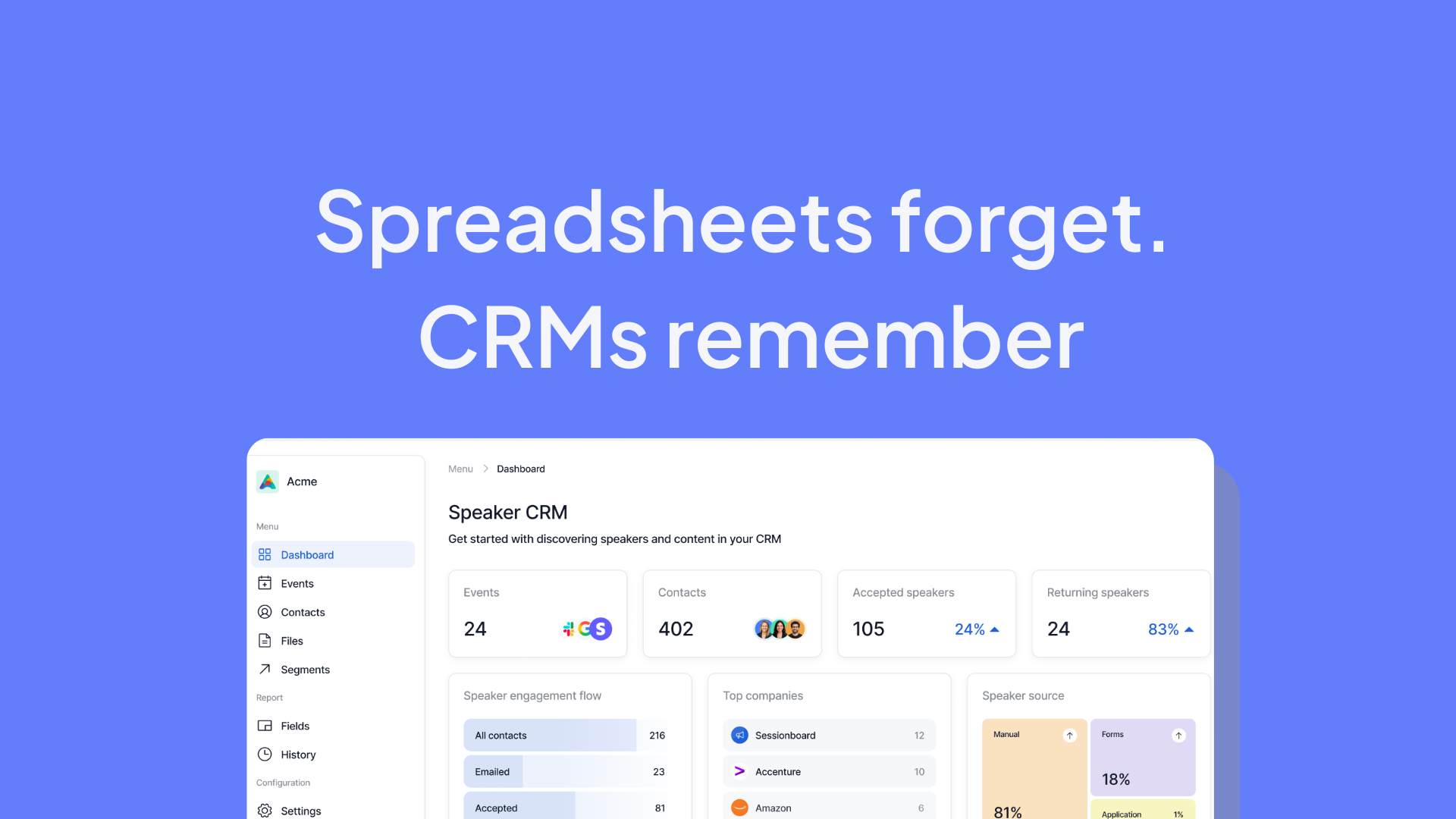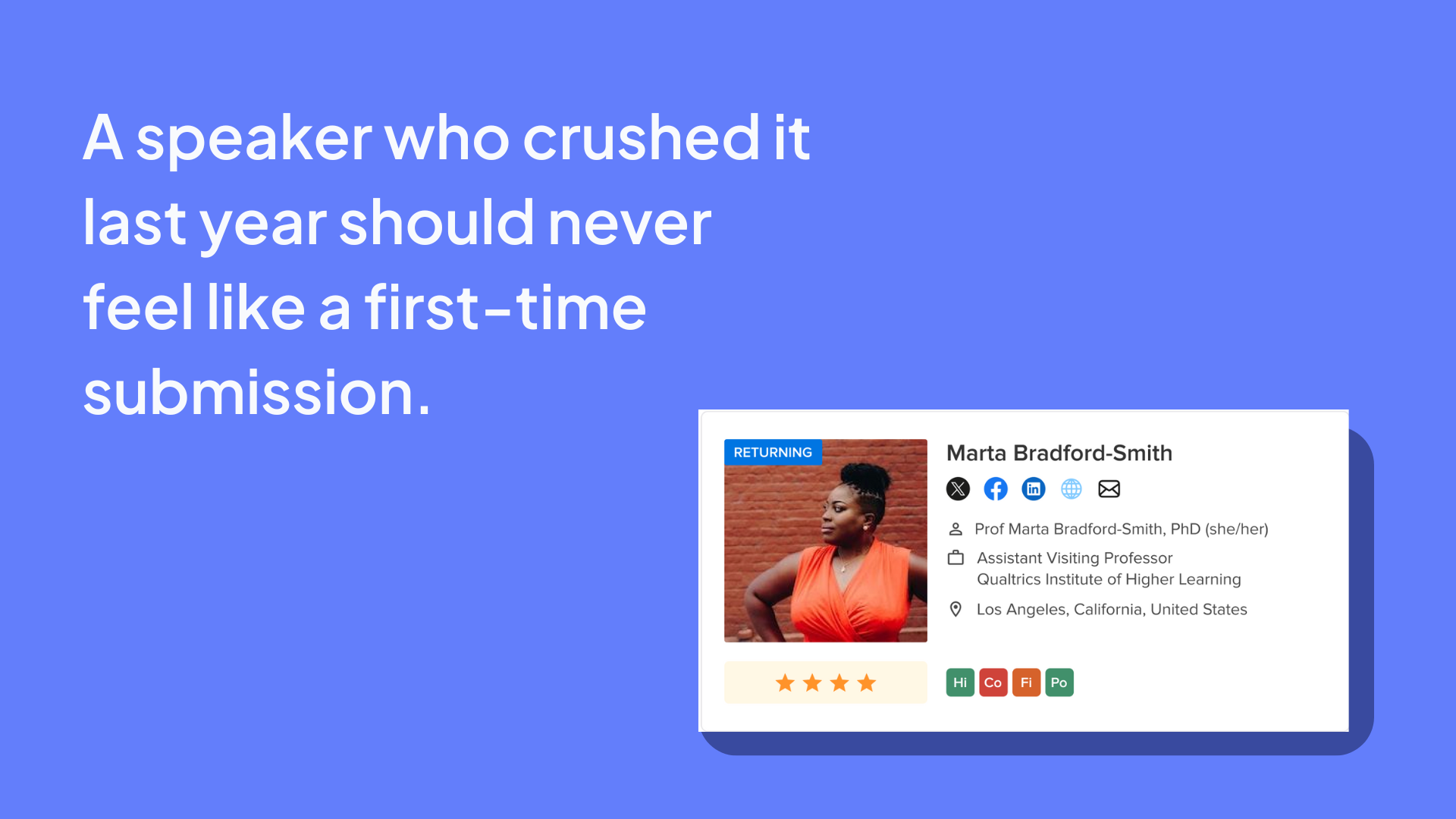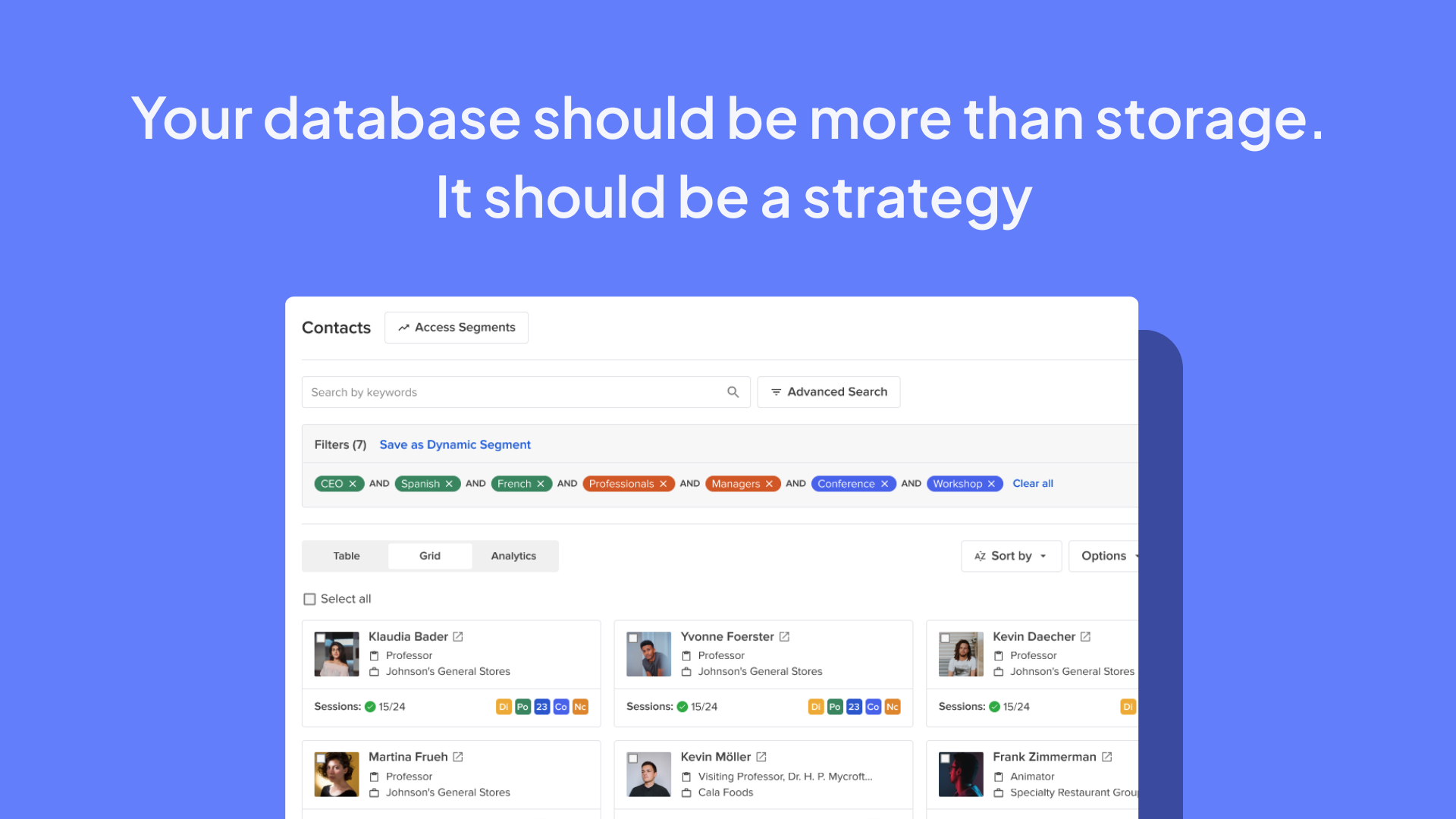Why Speaker CRMs Are the Future of Event Programming
Stop Starting from Zero Every Year

.png)
.png)
If you work in events, the cycle feels all too familiar. A new call for speakers goes out. Submissions start to pour in. Spreadsheets multiply. Email threads pile up. And by the time the agenda is finalized, your team has spent weeks tracking down bios, headshots, and abstracts that may already exist in a folder from last year’s event.
This cycle is not just repetitive. It is draining. Event professionals know how much time and energy it takes to manage speaker data without the right tools. Information is scattered across spreadsheets, emails, slide decks, and registration platforms that were never designed for content. Even simple questions like “Who spoke on this topic last year?” or “Which sessions had the highest ratings?” turn into time-consuming scavenger hunts.
The irony is that most associations and event teams already have a wealth of speaker talent at their fingertips. They work with experts who have presented in the past, thought leaders who have submitted before, and influencers who are connected to their network. The problem is not a lack of great speakers. The real challenge is finding them again and reusing their expertise without reinventing the process every single year.
And that is where a Speaker CRM changes everything. By treating speaker information as structured, reusable data instead of one-off submissions, it turns a messy, reactive process into a strategic advantage.
Without a dedicated system, speaker information lives in too many disconnected places. Some of it hides in spreadsheets from past events. Some is buried in long email threads with attachments that no one can find. Other pieces are locked away in slide decks, marketing files, or registration systems that were never designed to manage content.
When data is this fragmented, even the simplest questions become a major lift:
Finding answers takes hours, if it is even possible at all. Valuable context gets lost between events, and organizers are forced to rebuild knowledge that should already exist in a single, accessible system.
The result is not just extra work. It is wasted time, missed opportunities, and the constant feeling of starting from scratch with every new program cycle. Teams end up working harder without gaining the strategic insights that could help them design stronger agendas and reuse proven talent.
This is the reality for many associations and event organizers today, and it is why a Speaker CRM is no longer a nice-to-have. It is the missing link between scattered history and smarter programming.

For years, event professionals have relied on makeshift systems to manage speakers. Spreadsheets, forms, and file folders kept the basics together, but none of them were designed to capture the full history and value of a speaker. More recently, some tools have emerged that offer access to shared speaker pools, but those often serve as directories rather than systems of record. They help you find names, but they do not help you build an asset that grows with your own organization.
A Speaker CRM is different. It is a new category in event technology, purpose-built to centralize and structure all speaker information in one place. Instead of managing one-off submissions or browsing public databases, a Speaker CRM gives you ownership of your speaker data and connects it to the rest of your content workflow.
With a Speaker CRM, you can:
The result is more than a list of names. It is a strategic resource that compounds in value year after year. Instead of scrambling to rebuild knowledge with each event cycle, you create an institutional memory that makes programming faster, more consistent, and more insightful.
By treating speakers as long-term assets rather than one-time contributors, a Speaker CRM unlocks the ability to program with confidence and build agendas that are stronger, more balanced, and more relevant to your audiences.

When your speaker data is structured and centralized, programming no longer feels like guesswork. You can move beyond scrambling for submissions and start making decisions with clarity. The impact is immediate.
And the advantages multiply when you manage multiple events in a year or across chapters and regions. A Speaker CRM gives you one consistent source of truth. Instead of building each event from scratch, you can leverage the same database across annual conferences, regional summits, or virtual programs. This creates consistency, reduces duplicate work, and ensures that every event benefits from the cumulative knowledge of the ones that came before.
A Speaker CRM is not just a tool for convenience. It is a strategic asset. It helps you deliver stronger programs, cultivate lasting relationships with your experts, and elevate the professionalism of your entire event brand.

With Sessionboard’s Speaker CRM, every speaker becomes part of a living, growing system that you own and can build on over time. It is not just a list of contacts. It is a full record of expertise, history, and relationships that helps you program smarter, faster, and with more confidence.
Here is what that looks like in practice:
The result is a Speaker CRM that is more than storage. It is a relationship engine that helps you nurture your experts and keep them engaged even when they are not on stage. Past speakers can be reactivated for marketing, thought leadership, or future programming. Instead of treating them like anonymous attendees, you treat them as part of your professional community — respected, remembered, and valued.
Your next great speaker is not out of reach. They are already in your database. With Sessionboard, you have the tools to find them, activate them, and build on their expertise to deliver programs that stand out year after year.
Event teams should not feel like they are starting from zero every year. The truth is, your best speakers and strongest voices are already in your orbit. The challenge is unlocking that knowledge and turning it into a system you can build on.
A Speaker CRM transforms speaker information into structured, reusable data. It saves you time, reduces rework, and helps you surface talent that strengthens your programs year after year. Just as important, it ensures that speakers feel valued, remembered, and supported, not just for a single event but as part of your community.
This is not only about the event you are planning today. It matters just as much if you are six months away from your next program or if you have just wrapped up a major conference. Building a strong speaker system now means less stress, stronger programs, and more value for every event you run in the future.
👉 [Talk to Sales] to explore how a Speaker CRM can support your goals and change the way you program events.
Stop Starting from Zero Every Year
If you work in events, the cycle feels all too familiar. A new call for speakers goes out. Submissions start to pour in. Spreadsheets multiply. Email threads pile up. And by the time the agenda is finalized, your team has spent weeks tracking down bios, headshots, and abstracts that may already exist in a folder from last year’s event.
This cycle is not just repetitive. It is draining. Event professionals know how much time and energy it takes to manage speaker data without the right tools. Information is scattered across spreadsheets, emails, slide decks, and registration platforms that were never designed for content. Even simple questions like “Who spoke on this topic last year?” or “Which sessions had the highest ratings?” turn into time-consuming scavenger hunts.
The irony is that most associations and event teams already have a wealth of speaker talent at their fingertips. They work with experts who have presented in the past, thought leaders who have submitted before, and influencers who are connected to their network. The problem is not a lack of great speakers. The real challenge is finding them again and reusing their expertise without reinventing the process every single year.
And that is where a Speaker CRM changes everything. By treating speaker information as structured, reusable data instead of one-off submissions, it turns a messy, reactive process into a strategic advantage.
Without a dedicated system, speaker information lives in too many disconnected places. Some of it hides in spreadsheets from past events. Some is buried in long email threads with attachments that no one can find. Other pieces are locked away in slide decks, marketing files, or registration systems that were never designed to manage content.
When data is this fragmented, even the simplest questions become a major lift:
Finding answers takes hours, if it is even possible at all. Valuable context gets lost between events, and organizers are forced to rebuild knowledge that should already exist in a single, accessible system.
The result is not just extra work. It is wasted time, missed opportunities, and the constant feeling of starting from scratch with every new program cycle. Teams end up working harder without gaining the strategic insights that could help them design stronger agendas and reuse proven talent.
This is the reality for many associations and event organizers today, and it is why a Speaker CRM is no longer a nice-to-have. It is the missing link between scattered history and smarter programming.

For years, event professionals have relied on makeshift systems to manage speakers. Spreadsheets, forms, and file folders kept the basics together, but none of them were designed to capture the full history and value of a speaker. More recently, some tools have emerged that offer access to shared speaker pools, but those often serve as directories rather than systems of record. They help you find names, but they do not help you build an asset that grows with your own organization.
A Speaker CRM is different. It is a new category in event technology, purpose-built to centralize and structure all speaker information in one place. Instead of managing one-off submissions or browsing public databases, a Speaker CRM gives you ownership of your speaker data and connects it to the rest of your content workflow.
With a Speaker CRM, you can:
The result is more than a list of names. It is a strategic resource that compounds in value year after year. Instead of scrambling to rebuild knowledge with each event cycle, you create an institutional memory that makes programming faster, more consistent, and more insightful.
By treating speakers as long-term assets rather than one-time contributors, a Speaker CRM unlocks the ability to program with confidence and build agendas that are stronger, more balanced, and more relevant to your audiences.

When your speaker data is structured and centralized, programming no longer feels like guesswork. You can move beyond scrambling for submissions and start making decisions with clarity. The impact is immediate.
And the advantages multiply when you manage multiple events in a year or across chapters and regions. A Speaker CRM gives you one consistent source of truth. Instead of building each event from scratch, you can leverage the same database across annual conferences, regional summits, or virtual programs. This creates consistency, reduces duplicate work, and ensures that every event benefits from the cumulative knowledge of the ones that came before.
A Speaker CRM is not just a tool for convenience. It is a strategic asset. It helps you deliver stronger programs, cultivate lasting relationships with your experts, and elevate the professionalism of your entire event brand.

With Sessionboard’s Speaker CRM, every speaker becomes part of a living, growing system that you own and can build on over time. It is not just a list of contacts. It is a full record of expertise, history, and relationships that helps you program smarter, faster, and with more confidence.
Here is what that looks like in practice:
The result is a Speaker CRM that is more than storage. It is a relationship engine that helps you nurture your experts and keep them engaged even when they are not on stage. Past speakers can be reactivated for marketing, thought leadership, or future programming. Instead of treating them like anonymous attendees, you treat them as part of your professional community — respected, remembered, and valued.
Your next great speaker is not out of reach. They are already in your database. With Sessionboard, you have the tools to find them, activate them, and build on their expertise to deliver programs that stand out year after year.
Event teams should not feel like they are starting from zero every year. The truth is, your best speakers and strongest voices are already in your orbit. The challenge is unlocking that knowledge and turning it into a system you can build on.
A Speaker CRM transforms speaker information into structured, reusable data. It saves you time, reduces rework, and helps you surface talent that strengthens your programs year after year. Just as important, it ensures that speakers feel valued, remembered, and supported, not just for a single event but as part of your community.
This is not only about the event you are planning today. It matters just as much if you are six months away from your next program or if you have just wrapped up a major conference. Building a strong speaker system now means less stress, stronger programs, and more value for every event you run in the future.
👉 [Talk to Sales] to explore how a Speaker CRM can support your goals and change the way you program events.

Stay up to date with our latest news
See how real teams simplify speaker management, scale content operations, and run smoother events with Sessionboard.